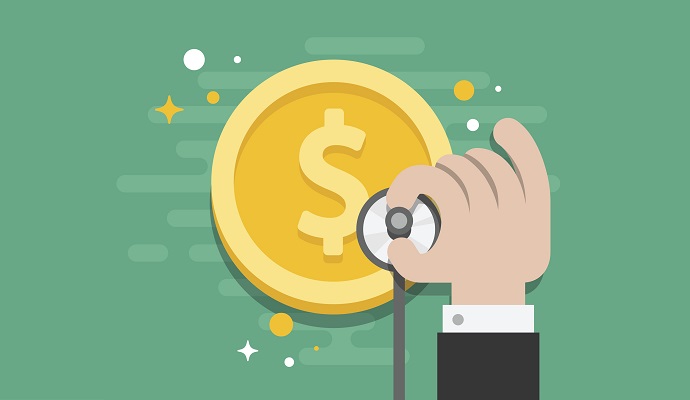Is Rising US Healthcare Spending Burdening the Economy?
While healthcare spending does take up 17 percent Of gross domestic product within the United States, viewing this as a burden on the country may lead to inferior policy recommendations.

- Is healthcare spending in the United States too high? Are the financial aspects of running the medical system around the country burdening the US economy? The National Center for Policy Analysis insists that the viewpoint claiming that healthcare spending is putting a burden on the US economy is misleading.

While healthcare spending does take up 17 percent Of gross domestic product within the United States, viewing this as a burden on the country may lead to inferior policy recommendations, the National Center for Policy Analysis stated.
The agency finds that Americans have more funds to spend on goods and services after paying for their medical care than in most other developed nations. In addition, healthcare spending tends to be a result of other economic activity.
The policy brief explains that the United States has had stronger economic growth over the last 56 years than most comparable developed nations except for Switzerland and Norway.
In fact, the brief explains that patients in this country spend far less on healthcare services than consumers of other developed nations.However, since 1960, the share of US gross domestic product set aside for healthcare has more than tripled.
Essentially, the gross domestic product per capita has increased more quickly than that of healthcare spending. Norway and Switzerland are the only other two developed nations that have had their GDP rise faster than that of the United States.
When excluding the costs of health and social services from citizens’ income, the United States is left with a higher gross domestic product than most other developed countries. This may not necessarily be a positive if other nations are spending more on medical care, as it could leave healthcare access and quality of care below par than the nations who put more funds into their healthcare spending.
The brief argues that there may be more elements to consider when looking at foreign Healthcare System than merely “universal healthcare” or “single-payer reimbursement.” For instance, it is important to understand that patients control only about 11.8 percent of their medical dollars while other nations hold greater percentages for this particular measurement.
The brief from the National Center for Policy Analysis continues to stress that healthcare spending is not a burden on the US economy. More recently, the Commonwealth Fund released a report outlining how high healthcare spending in the United States is and how other nations have a more affordable medical care system due to the fact that these nations have universal healthcare coverage.
The findings from these type of reports often state that reforming the healthcare system in this country to ensure universal coverage and allow the government to deliver payment or even run hospitals would lead to reduced healthcare spending, the brief states.
Healthcare spending may not be as much of a burden since Americans tend to have a higher national income than other nations. The report states that, while Americans spend more on their medical costs than the British, the typical American also had $9,185 more GDP after calculating their healthcare spending than that of someone from the United Kingdom.
“Improving US healthcare by learning from other countries is important, but simply focusing on the share of GDP accounted for by health spending is a red herring, leading to poor policy recommendations that rely on increasing the role of government in health care, as other developed countries have done since the World War II,” the report stated.
“The American health system, despite its many faults, has not measurably hindered the growth of the economy or per capita income. Over the last half century, America has increased its GDP per capita available to spend on goods and services outside health care much more than other developed countries have.”
Is the American economy still strong despite its high numbers in healthcare spending? This report finds it so. Nonetheless, Americans who lack health insurance and those living with chronic medical conditions often struggle to pay their medical bills. For instance, people living with HIV or AIDS often lack access to proper treatment due to high medical costs.
 “The challenge is that while we know today that treatment can extend the life of a person infected to almost that of the uninfected and we know today that a person on treatment and virally-suppressed is almost impossible to transmit HIV to another person, the reality today in the US is that less than one-third of the 1.2 million Americans living with HIV are on treatment and virally-suppressed,” Michael Kaplan, President and CEO of AIDS United, told HealthPayerIntelligence.com.
“The challenge is that while we know today that treatment can extend the life of a person infected to almost that of the uninfected and we know today that a person on treatment and virally-suppressed is almost impossible to transmit HIV to another person, the reality today in the US is that less than one-third of the 1.2 million Americans living with HIV are on treatment and virally-suppressed,” Michael Kaplan, President and CEO of AIDS United, told HealthPayerIntelligence.com.
“All of that has to do with access issues. It has to do with affordability, transparency and everything from dignified and culturally-competent care to knowing what drugs are covered in the formulary.”
As the healthcare industry continues to reform its payment practices, it may find that there is no significant financial burden on the average American but those living with life-threatening or chronic medical conditions may need more assistance with bringing affordability to the healthcare space.
